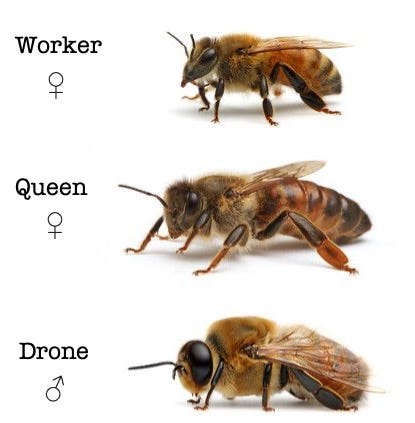One Season in the Skin of a Honeybee
What if you were born a bee?

Would you like to know what it’s like to be one of the most intelligent social beings on the planet, yet a million times smaller than a human?
Here’s the life that would have been expected of you, little worker bee
It is the end of winter, on a sunny day, when your egg is lovingly laid by your Mother in the depth of a golden cell. Your early life in the egg and larval stage go through several transformations until you fill your room tightly and yearn to get free. Today is the day, and you start eating out your shell, when a nurse bee comes to your aid and nibbles out the entrance with you.
Like the great majority of the hive, you are a female. It means your Mother, the Queen, met her destiny and was fecundated by her Prince. Your father died minutes after his orgasm, spreading his insides in the sky, but his sacrifice was the paroxysm of his life and assured a future for the City, which you most perfectly represent.
Here you are, a newborn, and the nurse is feeding you with a delicious nutritive paste.
Your youth and first jobs
You can’t wait to contribute to the life of the family. You feel strong, and your first job is to clean up the alveoles. After 5 or 6 days of this, you are able to secrete food and start feeding the larvae. You are now a nurse, like the one who helped deliver you to this world. You are very dedicated, each larva is fed over a thousand times and checked up 7000 times. After some days of this you become a ventilator, warming up or cooling down the hive from the vigorous vibration of your wings. This chore is of crucial importance for the comfort of your fellows, but also to help the honey dry and have a longer preservation. In the meantime, chemist bees add a drop of formic acid to the golden syrup so it keeps good.
At 3 weeks, in the peak of your strength, you have reached majority, and can fly away for the first time to meet the sun and flowers. According to what is available today, you will be guided to one of the areas with highest pollinic quality, which changes on a day to day basis. Although you could live off a few flowers, you are expected to visit 200 to 300 an hour, to accumulate pollen for the reserves of the hive. You can sense that with this rhythm you will die of exhaustion within a few weeks, but this is your purpose in life, and you are doing this for a cause that is bigger than you, and even bigger than the hive. You are doing this for the Future, for the Prosperity of the species. This honey will be needed for the winter, for the males, and for the rebirth of the city after the swarm.
The swarm, your grand exodus
The swarm, you ask? Get ready, as spring is here now and the princesses are sleeping. The hive is almost full of honey, it already smells like the excitement of a new life. You can feel from the energy all around you that it is coming: we are going to leave for another home. A quarter of the bees, thousands of eggs and larva in maturation and the sleeping princesses will stay and reconstruct the bee-power. You know that you will be among the 70,000 flying away, and you are thrilled, even if it means leaving everything you worked for ever since you were born.
Today is the day. You see the Queen getting ready too, even though she appears more reluctant than the rest. Maybe she’s not that used to seeing the sun, she’s only been exposed once, that day she discovered and lost her love. You are careful never to turn your back on her — she’s not like anyone else. The signal must have been given, your sisters have risen altogether as a black ball in the sky. You’re vibrating with them, in full bliss. Today is no work, today is only about the spirit of the hive, the celebration of the community.
“All beings have a moment of blind delight that Nature reserves them when She wants to get to an end.” Maurice Maeterlinck
Building up a new home, all united in masonry
A few scouts went far away to explore the best spots to establish the new colony, while the swarm is resting under a branch. Here they are, they finally came back! Each one is exposing to the community the spot she found, and the community ponders about the best decision. This is an important one that can affect our survival for generations. The deliberation is over, we’ll go build our new home under the brand of a tree* that sits in proximity of flowery meadows and accessible water.
*This key step in the natural life of the hive may not be so common anymore, as most of the bees live in apiaries provided by Man today. They no longer build the whole hive, but construct the alveoles in the wooden houses that save them time and energy. It is now seldom to observe wild hives, under branches of trees or in holes in the wood.

Altogether, you and your sisters make a bell-shape out of your bodies and heat up the atmosphere. When the temperature is high enough, you can secrete wax from our abdomen. The first bee is ready: you witness your sister climb on top of everyone, retrieve the wax from her sides, knead it, trim it, make it into the right shape and placing it at the top. This will be the cornerstone holding the hive together. Another bee has just taken her place and continued her work. Wax is coming out of your sides too, you will be next. It is so rewarding and satisfying to be part of this, each one of you placing your contribution. Within a short time, the hive is taking shape, the alveoles are multiplying, and your Mother is already hatching eggs.
Gathering pollen, taking care of the hive, growing in competence
You go back to your previous work, foraging for flowers pollen and nectar to feed the larvae and the nymphs. This is exhausting, and you swap every few hours with other teams, to change chores and keep effective. Some days you check the alveoles filled with honey, and when they are full and dry, you operculate the storehouses. Sometimes you work as a necrophore, taking the dead bodies out to make sure the corridors are free and the air keeps fresh. Other times, which can be unpredictably the most restful or the most demanding, you take turns as a guard, interrogating and checking passers-by. You encourage the young ones doing their first outing and scare away wanderers, intruders, and thieves. Thieves are often bees from other hives: not everyone is as morale as we are, and some of the neighbors can realize at any time that it’s easier to get ready-made honey from hard-workers than to harvest the pollen and do all the cooking themselves.
The dusk of your life
One evening, as you are busy visiting flowers, you don’t realize the sun coming down quicker. You get stuck without the warm energy, you can’t make your way back to the hive. You sleep on a stem of thyme, but you are freezing cold all night. The next few days, you are weaker and not quite as fast collecting pollen. Your wings are old and damaged, and flying is getting harder and harder. You lay down on the ground a second to rest on your way back to the hive, heavy with pollen, and you don’t see a lizard approaching. The end of you.
To discover your life if you had been raised a Queen bee or been born a male read this and that associated stories.
Note: This bee-story is inspired by Maeterlinck’s The Life of the Bee, a perfect example of the Ideal Book: it offers genuine learning of a totally different species, a change of perspective, it transmits enthusiasm and awe for life, while elevating spirits, heart, and soul. Although bees live a completely different life from ours, it is comparable in so many ways, and appears superior in some, as in their dedication to the community and to the future. Bees give us honey and wax, but the most precious presents they offer us are the harmony & abundance of the sunny days, and the humbling realization that there are other forms of intelligence out there.
If you love bees, there are many associations you can sustain, and if you have a garden, several things you can do to help your little friends thrive through hard times. Put cobblestones in a big bowl filled with water so the bees can drink without drowning, and sow flowers with high pollinic potential.
